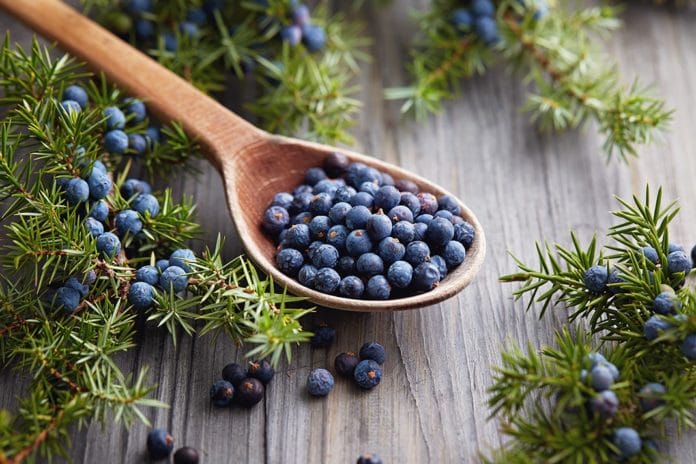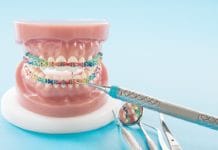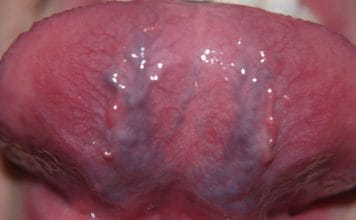During my first year of hygiene school, I went home to spend Christmas with my family. Among my gifts was a package from an exchange student who my parents hosted in 2015. Inside the package were numerous gifts, but the ones that caught my attention were the thin tubes of toothpaste.
One tube seemed like a traditional mint whitening paste, but the other one really piqued my curiosity. This toothpaste was slate gray and had a juniper branch adorning the label. The texture of the paste was smooth, and the taste was organic. It was unusual but not unpleasant. The scent brought back memories of the old timbered ridgeline where Dad and I used to hike and hunt for mule deer.
Most of the labels were in Russian, but one statement in English stood out to me: “fluoride-free.” When I looked up the ingredients online, I was unsurprised to find that there was activated charcoal in the ingredients. The unusual ingredient that turned out to be the source of the strange taste and aroma was juniper berry extract.
Why would my exchange sister, who is studying to become a dentist, send me a fluoride-free product with such untraditional ingredients?
We have all read the literature on charcoal and the hoax behind its uses in dentistry. I wanted to know more about the juniper extract. What I found is that juniper berries have antimicrobial and anti-inflammatory properties. In fact, juniper berries were used to treat a medley of ailments in ancient European societies such as cholera, tapeworm, and typhoid. Native Americans also used juniper berries in their arsenal of natural remedies.1 Perhaps this ingredient wasn’t so untraditional after all?
Mechanisms of Action
Juniper is full of monoterpenes that are responsible for the antibacterial and antifungal properties of the oil through the production of terpene alcohols. These alcohols have proven their viability in inhibiting Gram-positive bacteria and Gram-negative bacteria. They have also garnered positive results reducing edema through the inhibition cyboxygenase-2 (COX-2).2 Juniper oil also inhibits the production of interferon, so it’s a double whammy on the anti-inflammatory defense!3
The antifungal properties of juniper are impressive as well. An online study, Potential of plant oils as inhibitors of Candida albicans growth, used the disc diffusion method to measure the fungicidal effects of plant-derivative essential oils. Juniper did well with zones of inhibition measuring five millimeters.4 It is believed that the community of monoterpenes are also responsible for juniper’s antifungal pizzazz.5
How Do We Relate This to Our Patients?
Juniper toothpastes exist at a higher price than traditional toothpastes and can be found online or at whole food stores. Juniper oil may also be used as a mouthwash, although it is important that patients understand that they must follow the instructions provided on their purchase. Purchasing a quality, undiluted oil is also important.
Some rules of thumb to follow when purchasing oil is to make sure the oil is stored in a dark glass bottle, is pure (some companies dilute their products with vegetable oil), and states the Latin name of the oil.6 Cost-effectiveness should not be trusted when purchasing oils as cheap oils are usually products that break these rules.
Safety concerns do exist. Juniper oil is safe when consumed in small amounts with food but can be toxic if higher doses are consumed or if consumption is extended over a long period of time. Juniper oil should not be consumed in any amount if the patient is pregnant. Using juniper oil while pregnant may induce a miscarriage. Breastfeeding should also be avoided when using the oil as there is not enough research to assure safety. Informing patients that juniper oral products should not be swallowed and that they should be used in the same manner as traditional oral products is important.7
After considering what I learned in my research and debunking my own misguided feelings about the voodoo witchcraft hoaxes of essential oils, I realized there could be a place for holistic toothpastes in our operatories. There are many communities around the world, and even in my home state of Montana, which are focusing their energy on living more natural lifestyles. In dentistry, we often get the familiar push-back when discussing fluoride treatments and products with patients. Perhaps a toothpaste with juniper oil would be a suitable substitution for a patient who wants to use a fluoride-free dentifrice.
We now know that the benefits of juniper oil in dental science are credible and real. There may be room in the future of our profession for nontraditional patient education as we move into a world focused on more natural and sustainable living.
Before you leave, check out the Today’s RDH self-study CE courses. All courses are peer-reviewed and non-sponsored to focus solely on high-quality education. Click here now.
Listen to the Today’s RDH Dental Hygiene Podcast Below:
References
- Amber F. The History of Juniper and Its Healing Properties. 2019. Retrieved from https://amberfreda.com/history-juniper-healing-properties/.
- Kazio, A., Stryjewska, A., Librowski, T., Lochyński, S. An Overview of the Pharmacological Properties and Potential Applications of Natural Monoterpenes, Mini Reviews in Medicinal Chemistry. PubMed. 2014; 14(4). Retrieved from https://www.researchgate.net/publication/268880152_An_Overview_of_the_Pharmacological_Properties_and_Potential_Applications_of_Natural_Monoterpenes.
- Han, X., Parker, T. L. Anti-inflammatory Activity of Juniper (Juniperus communics) Berry Essential Oil in Human Dermal Fibroblasts. Cogent Medicine. 2017; 4(1). Retrieved from https://www.tandfonline.com/doi/full/10.1080/2331205X.2017.1306200
- Devkatte, A.N., Zore, G.B., Karuppayil, M. Potential of Plant Oils as Inhibitors of Candida albicans Growth. FEMS Yeast Research. 2005; 5(9): 867-873. Retrieved from https://academic.oup.com/femsyr/article/5/9/867/681672.
- Filipowicz, N.H., Kaminski, M.M., Kurlenda, J. Antibacterial and Antifungal Activity of Juniper Berry Oil and Its Selected Components. Phytotherapy Research. 2003; 17(3): 227-31. Retrieved from https://www.researchgate.net/publication/10825318_Antibacterial_and_antifungal_activity_of_juniper_berry_oil_and_its_selected_components
- Wong, C. Buying Better Essential Oils. Very Well Health. 2020, Apr 9. Retrieved from https://www.verywellhealth.com/tips-on-buying-essential-oils-88796
- Juniper. WebMD. 2020. Retrieved from https://www.webmd.com/vitamins/ai/ingredientmono-724/juniper













